53 start with S start with S
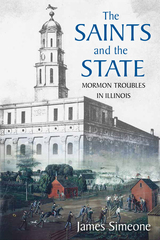
A compelling history of the 1846 Mormon expulsion from Illinois that exemplifies the limits of American democracy and religious tolerance.
When members of the Church of Jesus Christ of Latter-day Saints (known as Mormons) settled in Illinois in 1839, they had been persecuted for their beliefs from Ohio to Missouri. Illinoisans viewed themselves as religiously tolerant egalitarians and initially welcomed the Mormons to their state. However, non-Mormon locals who valued competitive individualism perceived the saints‘ western Illinois settlement, Nauvoo, as a theocracy with too much political power. Amid escalating tensions in 1844, anti-Mormon vigilantes assassinated church founder Joseph Smith and his brother Hyrum. Two years later, the state expelled the saints. Illinois rejected the Mormons not for their religion, but rather for their effort to create a self-governing state in Nauvoo.
Mormons put the essential aspirations of American liberal democracy to the test in Illinois. The saints’ inward group focus and their decision to live together in Nauvoo highlight the challenges strong group consciousness and attachment pose to democratic governance. The Saints and the State narrates this tragic story as an epic failure of governance and shows how the conflicting demands of fairness to the Mormons and accountability to Illinois’s majority became incompatible.

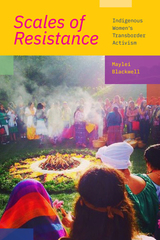

If there is a "culture war" taking place in the United States, one of the most interesting, if under-the-radar, battlegrounds is in local school board elections. Rarely does the pitch of this battle reach national attention, as it did in Kansas when the state school board—led by several outspoken conservative Christians—voted to delete evolution from the state's science curriculum and its standardized tests in August 1999. That action rattled not only the educational and scientific communities, but concerned citizens around the nation as well.
While the movement of the Christian Right into national and state politics has been well documented, this is the first book to examine their impact on local school board politics. While the Kansas decision was short-lived, during the past decade in school districts around the country, conservative Christian majorities have voted to place limits on sex education, to restrict library books, to remove references to gays and lesbians in the classroom, and to promote American culture as superior to other cultures.
School Board Battles studies the motivation, strategies, and electoral success of Christian Right school board candidates. Based on interviews, and using an extensive national survey of candidates as well as case studies of two school districts in which conservative Christians ran and served on local boards, Melissa M. Deckman gives us a surprisingly complex picture of these candidates. She reveals weaker ties to national Christian Right organizations—and more similarities between these conservative candidates and their more secular counterparts than might be expected.
Deckman examines important questions: Why do conservative Christians run for school boards? How much influence has the Christian Right actually had on school boards? How do conservative Christians govern? School Board Battles is an in-depth and in-the-trenches look at an important encounter in the "culture war"—one that may well determine the future of our nation's youth.
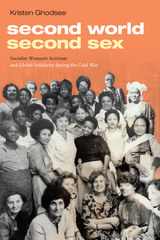
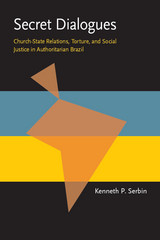
Secret Dialogues uncovers an unexpected development in modern Latin American history: the existence of secret talks between generals and Roman Catholic bishops at the height of Brazil's military dictatorship. During the brutal term of Emílio Garrastazú Médici, the Catholic Church became famous for its progressivism. However, new archival sources demonstrate that the church also sought to retain its privileges and influence by exploring a potential alliance with the military. From 1970 to 1974 the secret Bipartite Commission worked to resolve church-state conflict and to define the boundary between social activism and subversion. As the bishops increasingly made defense of human rights their top pastoral and political goal, the Bipartite became an important forum of protest against torture and social injustice. Based on more than 60 interviews and primary sources from three continents, Secret Dialogues is a major addition to the historical narrative of the most violent yet, ironically, the least studied period of the Brazilian military regime. Its story is intertwined with the central themes of the era: revolutionary warfare, repression, censorship, the fight for democracy, and the conflict between Catholic notions of social justice and the anticommunist Doctrine of National Security.
Secret Dialogues is the first book of its kind on the contemporary Catholic Church in any Latin American country, for most work in this field is devoid of primary documentary research. Serbin questions key assumptions about church-state conflict such as the typical conservative-progressive dichotomy and the notion of church-state rupture during harsh authoritarian periods. Secret Dialogues is written for undergraduate and graduate students, professional scholars, and the general reader interested in Brazil, Latin America, military dictatorship, human rights, and the relationship between religion and politics.
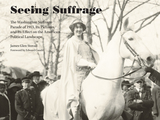
Although the women’s suffrage movement was sixty-five years old by 1913, the belief that women should vote was still controversial. Reactions to the march—a dazzling spectacle involving between five thousand and eight thousand participants—ranged from bemusement to resistance to violence. The lack of cooperation from the Washington police force exacerbated conflicts along the route and, ultimately, approximately one hundred marchers and participants were injured. Although suffrage leaders publicly expressed disgust at the conduct of the crowd and police, privately they were delighted with the turn of events, taking full advantage of the increased media coverage by repeatedly tying the unruly mob and the actions of the police to those who opposed votes for women.
The 1913 procession stands as one of the first political events in American history staged in great part for visual purposes. This revealing work recounts the march from the planning stages to the struggle up Pennsylvania Avenue and showcases the most interesting and informative photographs of that day. Although supporters needed seven more frustrating years to ratify the Nineteenth Amendment, the Washington Suffrage Parade of 1913 can, as this book demonstrates, rightly be seen as the moment that forced the public to take seriously the effort to secure the vote for women.
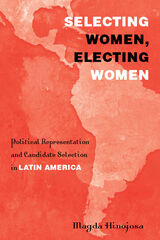
Selecting Women, Electing Women is a groundbreaking book that examines how the rules for candidate selection affect women’s political representation in Latin America. Focusing particularly on Chile and Mexico, Magda Hinojosa presents counterintuitive assumptions about factors that promote the election of women. She argues that primaries—which are regularly thought of as the most democratic process for choosing candidates—actually produce fewer female nominees than centralized and seemingly exclusionary candidate selection procedures.
Hinojosa astutely points out the role of candidate selection processes in explaining variation in women’s representation that exists both across and within political parties. Selecting Women, Electing Women makes critical inroads to the study of gender and politics, candidate selection, and Latin American politics.
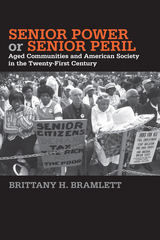
In Senior Power or Senior Peril, Bramlett examines the assertions that the increasing number of older adult-concentrated communities across the United States form a growing bloc of senior power that will influence the redistribution of particularized welfare benefits to older adults at the expense of younger people. However, others suggest that political influence declines with old age. Bramlett uses interviews and on-site research at various senior communities to explore what qualities make an aged community politically unique, and the impact of the local aged context on residents' political knowledge, safety-net policy attitudes, efficacy, and political activity.
This path-breaking book identifies the political behaviors, attitudes, and political consciousness of both older and younger residents as it recounts the perceived and actual political power of seniors.
In the series The Social Logic of Politics, edited by Scott McClurg
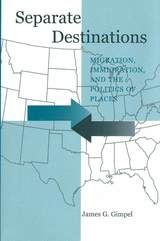
Newer immigrants are con-strained by a lack of education, money, English literacy, and information--and frequently by discrimination--to live in areas of coethnic settlement. Domestic, native-born migrants--predominantly Caucasian--free of discrimination and possessing more money and information, move where they wish, often to communities where immigrants are not welcome or cannot afford to live. Strong evidence suggests that spatially isolated immigrants are slower to naturalize and get involved in politics than domestic migrants.
Gimpel looks closely at states with very different patterns of migration and immigration: California, Colorado, Kansas, Kentucky, Florida, Pennsylvania, and New York. In these states, Gimpel shows the impact of population mobility on party registration, party votes, and voter turnout and asks whether population changes have changed the dominant party in a state or produced a political reaction from natives.
Separate Destinations contains a number of thematic maps detailing the settlement patterns of internal migrants and immigrants for both counties and census tracts. Blending insights from a number of social science disciplines, including economics, demography, sociology, political science, and anthropology, this book will be of interest to a wide and diverse readership of scholars, students, and policymakers.
James G. Gimpel is Associate Professor of Government, University of Maryland.
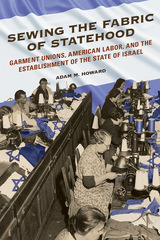
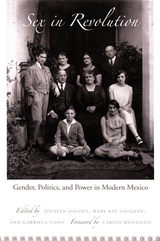
Concentrating on episodes and phenomena that occurred between 1915 and 1950, the contributors deftly render experiences ranging from those of a transgendered Zapatista soldier to upright damas católicas and Mexico City’s chicas modernas pilloried by the press and male students. Women refashioned their lives by seeking relief from bad marriages through divorce courts and preparing for new employment opportunities through vocational education. Activists ranging from Catholics to Communists mobilized for political and social rights. Although forced to compromise in the face of fierce opposition, these women made an indelible imprint on postrevolutionary society.
These essays illuminate emerging practices of femininity and masculinity, stressing the formation of subjectivity through civil-society mobilizations, spectatorship and entertainment, and locales such as workplaces, schools, churches, and homes. The volume’s epilogue examines how second-wave feminism catalyzed this revolutionary legacy, sparking widespread, more radically egalitarian rural women’s organizing in the wake of late-twentieth-century democratization campaigns. The conclusion considers the Mexican experience alongside those of other postrevolutionary societies, offering a critical comparative perspective.
Contributors. Ann S. Blum, Kristina A. Boylan, Gabriela Cano, María Teresa Fernández Aceves, Heather Fowler-Salamini, Susan Gauss, Temma Kaplan, Carlos Monsiváis, Jocelyn Olcott, Anne Rubenstein, Patience Schell, Stephanie Smith, Lynn Stephen, Julia Tuñón, Mary Kay Vaughan
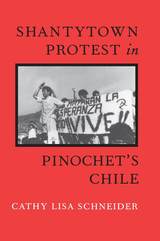
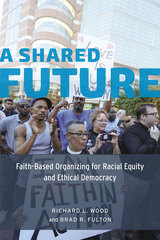
In A Shared Future, Richard L. Wood and Brad R. Fulton draw on a new national study of community organizing coalitions and in-depth interviews of key leaders in this field to show how faith-based organizing is creatively navigating the competing aspirations of America’s universalist and multiculturalist democratic ideals, even as it confronts three demons bedeviling American politics: economic inequality, federal policy paralysis, and racial inequity. With a broad view of the entire field and a distinct empirical focus on the PICO National Network, Wood and Fulton’s analysis illuminates the tensions, struggles, and deep rewards that come with pursuing racial equity within a social change organization and in society. Ultimately, A Shared Future offers a vision for how we might build a future that embodies the ethical democracy of the best American dreams.
An interview of the authors on the subject of faith leaders organizing for justice (Peace Talks Radio, copyright Good Radio Shows, Inc.) can be heard at this link: https://beta.prx.org/stories/190030
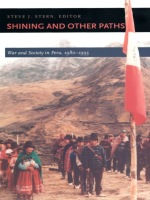
The contributors—a team of Peruvian and U.S. historians, social scientists, and human rights activists—explore the origins, social dynamics, and long-term consequences of the effort by Shining Path to effect an armed communist revolution. The book begins by interpreting Shining Path’s emergence and decision for war as one logical culmination, among several competing culminations, of trends in oppositional politics and social movements. It then traces the experiences of peasants and refugees to demonstrate how human struggle and resilience came together in grassroots determination to defeat Shining Path, and explores the unsuccessful efforts of urban shantytown dwellers, as well as rural and urban activists, to build a “third path” to social justice. Integral to this discussion is an examination of women’s activism and consciousness during the years of the crisis. Finally, this book analyzes the often paradoxical and unintended legacies of this tumultuous period for social and human rights movements, and for presidential and military leadership in Peru.
Extensive field research, broad historical vision, and strong editorial coordination enable the authors to write a coherent and deeply humanistic account, one that draws out the inner tragedies, ambiguities, and conflicts of the war.
Providing historically grounded explication of the conflicts that reshaped contemporary Peru, Shining and Other Paths will be widely read by Latin Americanists, historians, anthropologists, gender theorists, sociologists, political scientists, and human rights activists.
Contributors. Jo-Marie Burt, Marisol de la Cadena, Isabel Coral Cordero, Carlos Iván Degregori, Iván Hinojosa, Carlos Basombrío Iglesias, Florencia E. Mallon, Nelson Manrique, Hortensia Muñoz, Enrique Obando, Patricia Oliart, Ponciano del Pino H., José Luis Rénique, Orin Starn, Steve J. Stern

Like all empires, Japan’s prewar empire encompassed diverse territories as well as a variety of political forms for governing such spaces. This book focuses on Japan’s Kwantung Leasehold and Railway Zone in China’s three northeastern provinces. The hybrid nature of the leasehold’s political status vis-à-vis the metropole, the presence of the semipublic and enormously powerful South Manchuria Railway Company, and the region’s vulnerability to inter-imperial rivalries, intra-imperial competition, and Chinese nationalism throughout the first decades of the twentieth century combined to give rise to a distinctive type of settler politics. Settlers sought inclusion within a broad Japanese imperial sphere while successfully utilizing the continental space as a site for political and social innovation.
In this study, Emer O’Dwyer traces the history of Japan’s prewar Manchurian empire over four decades, mapping how South Manchuria—and especially its principal city, Dairen—was naturalized as a Japanese space and revealing how this process ultimately contributed to the success of the Japanese army’s early 1930s takeover of Manchuria. Simultaneously, Significant Soil demonstrates the conditional nature of popular support for Kwantung Army state-building in Manchukuo, highlighting the settlers’ determination that the Kwantung Leasehold and Railway Zone remain separate from the project of total empire.
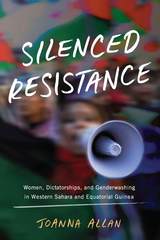
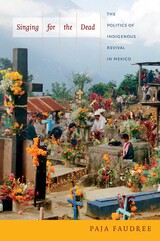
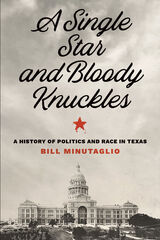
For John Nance “Cactus Jack” Garner, there was one simple rule in politics: “You’ve got to bloody your knuckles.” It’s a maxim that applies in so many ways to the state of Texas, where the struggle for power has often unfolded through underhanded politicking, backroom dealings, and, quite literally, bloodshed. The contentious history of Texas politics has been shaped by dangerous and often violent events, and been formed not just in the halls of power but by marginalized voices omitted from the official narratives.
A Single Star and Bloody Knuckles traces the state’s conflicted and dramatic evolution over the past 150 years through its pivotal political players, including oft-neglected women and people of color. Beginning in 1870 with the birth of Texas’s modern political framework, Bill Minutaglio chronicles Texas political life against the backdrop of industry, the economy, and race relations, recasting the narrative of influential Texans. With journalistic verve and candor, Minutaglio delivers a contemporary history of the determined men and women who fought for their particular visions of Texas and helped define the state as a potent force in national affairs.
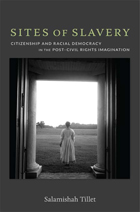
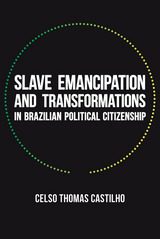
Winner, 2018 AHA/CLAH Dean Prize (best book on Brazilian History)
Celso Thomas Castilho offers original perspectives on the political upheaval surrounding the process of slave emancipation in postcolonial Brazil. He shows how the abolition debates in Pernambuco transformed the practices of political citizenship and marked the first instance of a mass national political mobilization. In addition, he presents new findings on the scope and scale of the opposing abolitionist and sugar planters’ mobilizations in the Brazilian northeast. The book highlights the extensive interactions between enslaved and free people in the construction of abolitionism, and reveals how Brazil’s first social movement reinvented discourses about race and nation, leading to the passage of the abolition law in 1888. It also documents the previously ignored counter-mobilizations led by the landed elite, who saw the rise of abolitionism as a political contestation and threat to their livelihood.
Overall, this study illuminates how disputes over control of emancipation also entailed disputes over the boundaries of the political arena and connects the history of abolition to the history of Brazilian democracy. It offers fresh perspectives on Brazilian political history and on Brazil’s place within comparative discussions on slavery and emancipation.
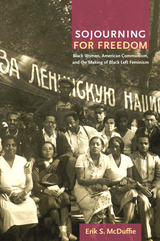

Winner of a Catholic Media Association Book Award
A revelatory account of the nouvelle théologie, a clerical movement that revitalized the Catholic Church’s role in twentieth-century French political life.
Secularism has been a cornerstone of French political culture since 1905, when the republic formalized the separation of church and state. At times the barrier of secularism has seemed impenetrable, stifling religious actors wishing to take part in political life. Yet in other instances, secularism has actually nurtured movements of the faithful. Soldiers of God in a Secular World explores one such case, that of the nouvelle théologie, or new theology. Developed in the interwar years by Jesuits and Dominicans, the nouvelle théologie reimagined the Church’s relationship to public life, encouraging political activism, engaging with secular philosophy, and inspiring doctrinal changes adopted by the Second Vatican Council in the 1960s.
Nouveaux théologiens charted a path between the old alliance of throne and altar and secularism’s demand for the privatization of religion. Envisioning a Church in but not of the public sphere, Catholic thinkers drew on theological principles to intervene in political questions while claiming to remain at arm’s length from politics proper. Sarah Shortall argues that this “counter-politics” was central to the mission of the nouveaux théologiens: by recoding political statements in the ostensibly apolitical language of doctrine, priests were able to enter into debates over fascism and communism, democracy and human rights, colonialism and nuclear war. This approach found its highest expression during the Second World War, when the nouveaux théologiens led the spiritual resistance against Nazism. Claiming a powerful public voice, they collectively forged a new role for the Church amid the momentous political shifts of the twentieth century.
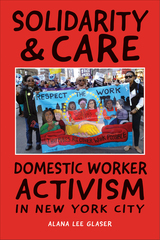
Solidarity & Care examines the political mobilization of diverse care workers who joined together and supported one another through education, protests, lobbying, and storytelling. Domestic work activists used narrative and emotional appeals to build a coalition of religious communities, employers of domestic workers, labor union members, and politicians to first pass and then to enforce the new law.
Through oral history interviews, as well as ethnographic observation during DWU meetings and protest actions, Glaser chronicles how these women fought (and continue to fight) to improve working conditions. She also illustrates how they endure racism, punitive immigration laws, on-the-job indignities, and unemployment that can result in eviction and food insecurity.
The lessons from Solidarity & Care along with the DWU’s precedent-setting legislative success have applications to workers across industries.
All royalties will go directly to the Domestic Workers United
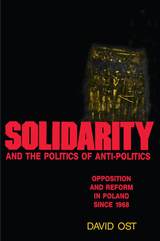

---Lech Walesa, former President of Poland and winner of the 1983 Nobel Peace Prize
Solidarity's Secret is the first book to record the crucial yet little-known role women played in the rise of an independent press in Poland and in the fall of that country's communist government.
Shana Penn pieces together a decade of interviews with the women behind the Polish pro-democracy movement-women whose massive contributions were obscured by the more public successes of their male counterparts.
Penn reveals the story of how these brave women ran Solidarity and the main opposition newspaper, Tygodnik Mazowsze, while prominent men like Lech Walesa were underground or in jail during the 1980s martial law years. The same women then went on to play influential roles in post-communist Poland.
Solidarity's Secret gives us a richly detailed story-within-a-story-unheard of not only in the West, but until recently even within Poland itself-from one of the most important eras in modern history.
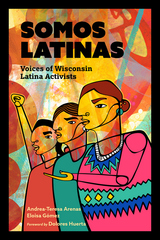
Celebrated Latina civil rights activist Dolores Huerta once said, “Every moment is an organizing opportunity, every person a potential activist, every minute a chance to change the world.” These are the stories of some of the Latina activists from Wisconsin who have lived Huerta’s words. Somos Latinas shares the powerful narratives of 25 activists—from outspoken demonstrators to collaborative community-builders to determined individuals working for change behind the scenes—providing proof of the long-standing legacy of Latina activism throughout Wisconsin.
Somos Latinas draws on activist interviews conducted as part of the Somos Latinas Digital History Project, housed at the Wisconsin Historical Society, and looks deep into the life and passion of each woman. Though Latinas have a rich history of community activism in the state and throughout the country, their stories often go uncelebrated. Somos Latinas is essential reading for scholars, historians, activists, and anyone curious about how everyday citizens can effect change in their communities.
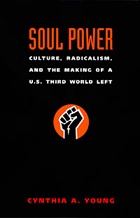
Young analyzes a range of U.S. figures and organizations, examining how each deployed Third World discourse toward various cultural and political ends. She considers a trip that LeRoi Jones, Harold Cruse, and Robert F. Williams made to Cuba in 1960; traces key intellectual influences on Angela Y. Davis’s writing; and reveals the early history of the hospital workers’ 1199 union as a model of U.S. Third World activism. She investigates Newsreel, a late 1960s activist documentary film movement, and its successor, Third World Newsreel, which produced a seminal 1972 film on the Attica prison rebellion. She also considers the L.A. Rebellion, a group of African and African American artists who made films about conditions in the Watts neighborhood of Los Angeles. By demonstrating the breadth, vitality, and legacy of the work of U.S. Third World Leftists, Soul Power firmly establishes their crucial place in the history of twentieth-century American struggles for social change.
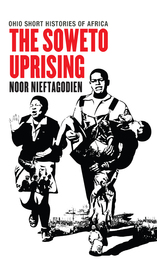
The Soweto uprising was a true turning point in South Africa’s history. Even to contemporaries, it seemed to mark the beginning of the end of apartheid. This compelling book examines both the underlying causes and the immediate factors that led to this watershed event. It looks at the crucial roles of Black Consciousness ideology and nascent school-based organizations in shaping the character and form of the revolt. What began as a peaceful and coordinated demonstration rapidly turned into a violent protest when police opened fire on students. This short history explains the uprising and its aftermath from the perspective of its main participants, the youth, by drawing on a rich body of oral histories.
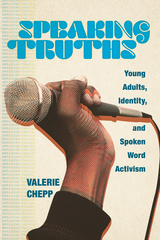
Drawing upon detailed observations and in-depth interviews, Chepp tells the story of a diverse group of young adults from Washington, D.C. who use spoken word to create a more just and equitable world. Outlining the contours of this approach, she interrogates spoken word activism’s emphasis on personal storytelling and “truth,” the strategic uses of aesthetics and emotions to politically engage across difference, and the significance of healing in sustainable movements for change. Weaving together their poetry and personally told stories, Chepp shows how poets tap into the beautiful, emotional, personal, and therapeutic features of spoken word to empathically connect with others, advance intersectional and systemic analyses of inequality, and make social justice messages relatable across a diverse public. By creating allies and forging connections based on friendship, professional commitments, lived experiences, emotions, artistic kinship, and political views, this activist approach is highly integrated into the everyday lives of its practitioners, online and face-to-face.
Chepp argues that spoken word activism is a product of, and a call to action against, the neoliberal era in which poets have come of age, characterized by widening structural inequalities and increasing economic and social vulnerability. She illustrates how this deeply personal and intimate activist approach borrows from, builds upon, and diverges from previous social movement paradigms. Spotlighting the complexity and mutual influence of modern-day activism and the world in which it unfolds, Speaking Truths contributes to our understanding of contemporary social change-making and how neoliberalism has shaped this political generation’s experiences with social injustice.

Conventional wisdom would have us believe that every immigrant to the United States “became American,” by choice and with deliberate speed. Yet, as Special Sorrows shows us, this is simply untrue. In this compelling revisionist study, Matthew Frye Jacobson reveals tenacious attachments to the Old World and explores the significance of homeland politics for Irish, Polish, and Jewish immigrants at the turn of the twentieth century.
Drawing on Yiddish, Polish, and English-language sources, Jacobson discovers the influence of nationalist ideologies in the overt political agendas of such ethnic associations as the Knights of Zion and the Polish Falcons, as well as in newspapers, vernacular theater, popular religion, poetry, fiction, and festivals, both religious and secular. In immigrant communities, he finds that nationalism was a powerful component of popular sensibility.
A captivating example of Jacobson’s thesis is immigrant reaction to American intervention in Cuba. Masculinist/militarist strains of nationalist culture met with the keen impulse to aid a subjugated people. The three national groups, rich with memories of their own subjugation, found an unlikely outlet in the Caribbean. But when the U.S. war for Cuban liberation was followed by a crusade for Philippine subjugation, immigrants faced a dilemma: some condemned the American empire rich in Old World parallels; others dismissed the Filipinos as racial “others” and embraced the glories of conquest. In effect, the crucible of American imperialism was vital to many immigrants’ Americanization, in the sense of passionate participation in national politics, pro or con.
This work answers the call of scholars to recover the full experience of these immigrants. It adds to the tapestry of America’s turn-of-the-century political culture and restores an essential transnational dimension to questions of ethnic identity and behavior.

During the period of Goldstein’s fieldwork in Villa Pagador in the mid-1990s, residents attempted to lynch several thieves and attacked the police who tried to intervene. Since that time, there have been hundreds of lynchings in the poor barrios surrounding Cochabamba. Goldstein presents the lynchings of thieves as a form of horrific performance, with elements of critique and political action that echo those of local festivals. He explores the consequences and implications of extralegal violence for human rights and the rule of law in the contemporary Andes. In rich detail, he provides an in-depth look at the development of Villa Pagador and of the larger metropolitan area of Cochabamba, illuminating a contemporary Andean city from both microethnographic and macrohistorical perspectives. Focusing on indigenous peoples’ experiences of urban life and their attempts to manage their sociopolitical status within the broader context of neoliberal capitalism and political decentralization, The Spectacular City highlights the deep connections between performance, law, violence, and the state.
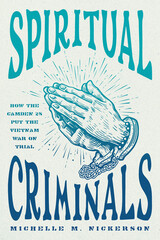
When the FBI arrested twenty-eight people in connection to a break-in at a Camden, New Jersey, draft board in 1971, the Bureau celebrated. The case should have been an easy victory for the department—the perpetrators had been caught red-handed attempting to destroy conscription documents for draftees into the Vietnam War. But the results of the trial surprised everyone, and in the process shook the foundations of American law, politics, and religion.
In Spiritual Criminals, Michelle M. Nickerson shares a complex portrait of the Camden 28, a passionate group of grassroots religious progressives who resisted both their church and their government as they crusaded against the Vietnam War. Founded by priests, nuns, and devout lay Catholics, members of this coalition accepted the risks of felony convictions as the cost of challenging the nation’s military-industrial complex and exposing the illegal counterintelligence operations of the FBI. By peeling away the layers of political history, theological traditions, and the Camden 28’s personal stories, Nickerson reveals an often-unseen spiritual side of the anti-war movement. At the same time, she probes the fractures within the group, detailing important conflicts over ideology, race, sex, and gender that resonate in the church and on the political Left today.
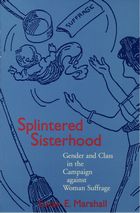
When Tennessee became the thirty-sixth and final state needed to ratify the Nineteenth Amendment in August 1920, giving women the right to vote, one group of women expressed bitter disappointment and vowed to fight against “this feminist disease.” Why this fierce and extended opposition? In Splintered Sisterhood, Susan Marshall argues that the women of the antisuffrage movement mobilized not as threatened homemakers but as influential political strategists.
Drawing on surviving records of major antisuffrage organizations, Marshall makes clear that antisuffrage women organized to protect gendered class interests. She shows that many of the most vocal antisuffragists were wealthy, educated women who exercised considerable political influence through their personal ties to men in politics as well as by their own positions as leaders of social service committees. Under the guise of defending an ideal of “true womanhood,” these powerful women sought to keep the vote from lower-class women, fearing it would result in an increase in the “ignorant vote” and in their own displacement from positions of influence. This book reveals the increasingly militant style of antisuffrage protest as the conflict over female voting rights escalated. Splintered Sisterhood adds a missing piece to the history of women’s rights activism in the United States and illuminates current issues of antifeminism.
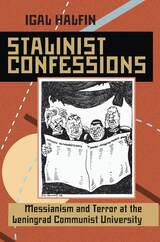
During Stalin's Great Terror, accusations of treason struck fear in the hearts of Soviet citizens-and lengthy imprisonment or firing squads often followed. Many of the accused sealed their fates by agreeing to confessions after torture or interrogation by the NKVD. Some, however, gave up without a fight.
In Stalinist Confessions, Igal Halfin investigates the phenomenon of a mass surrender to the will of the state. He deciphers the skillfully rendered discourse through which Stalin defined his cult of personality and consolidated his power by building a grassroots base of support and instilling a collective psyche in every citizen. By rooting out evil (opposition) wherever it hid, good communists could realize purity, morality, and their place in the greatest society in history. Confessing to trumped-up charges, comrades made willing sacrifices to their belief in socialism and the necessity of finding and making examples of its enemies.
Halfin focuses his study on Leningrad Communist University as a microcosm of Soviet society. Here, eager students proved their loyalty to the new socialism by uncovering opposition within the University. Through their meetings and self-reports, students sought to become Stalin's New Man.
Using his exhaustive research in Soviet archives including NKVD records, party materials, student and instructor journals, letters, and newspapers, Halfin examines the transformation in the language of Stalinist socialism. From an initial attitude that dismissed dissent as an error in judgment and redeemable through contrition to a doctrine where members of the opposition became innately wicked and their reform impossible, Stalin's socialism now defined loyalty in strictly black and white terms. Collusion or allegiance (real or contrived, now or in the past) with “enemies of the people” (Trotsky, Zinoviev, Bukharin, Germans, capitalists) was unforgivable. The party now took to the task of purging itself with ever-increasing zeal.
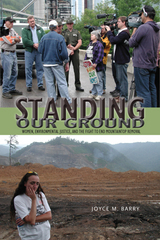
Standing Our Ground: Women, Environmental Justice, and the Fight to End Mountaintop Removal examines women’s efforts to end mountaintop removal coal mining in West Virginia. Mountaintop removal coal mining, which involves demolishing the tops of hills and mountains to provide access to coal seams, is one of the most significant environmental threats in Appalachia, where it is most commonly practiced.
The Appalachian women featured in Barry’s book have firsthand experience with the negative impacts of Big Coal in West Virginia. Through their work in organizations such as the Coal River Mountain Watch and the Ohio Valley Environmental Coalition, they fight to save their mountain communities by promoting the development of alternative energy resources. Barry’s engaging and original work reveals how women’s tireless organizing efforts have made mountaintop removal a global political and environmental issue and laid the groundwork for a robust environmental justice movement in central Appalachia.
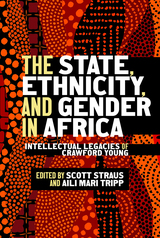
Written in honor of Crawford Young, a foundational figure in the study of African politics, the essays reflect the breadth and intellectual legacy of this towering scholar and illustrate the vast impact Young had, and continues to have, on the field. The book’s themes build from his seminal publications, and the essays were written by leading scholars who were trained by Young.

On weekday afternoons, dismissal bells signal not just the end of the school day but also the beginning of another important activity: the federally funded after-school programs that offer tutoring, homework help, and basic supervision to millions of American children. Nearly one in four low-income families enroll a child in an after-school program. Beyond sharpening students’ math and reading skills, these programs also have a profound impact on parents. In a surprising turn—especially given the long history of social policies that leave recipients feeling policed, distrusted, and alienated—government-funded after-school programs have quietly become powerful forces for political and civic engagement by shifting power away from bureaucrats and putting it back into the hands of parents. In State of Empowerment Carolyn Barnes uses ethnographic accounts of three organizations to reveal how interacting with government-funded after-school programs can enhance the civic and political lives of low-income citizens.
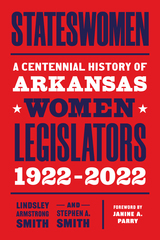
The first comprehensive study dedicated to these trailblazing Arkansas legislators, Stateswomen will surely inspire history buffs, community-minded citizens, and political hopefuls alike.
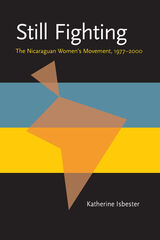
How did women in an economically underdeveloped Central American country, with little history of organizing, feminism, or democracy, succeed in creating networks, organizations, and campaigns that carved out a gender identity and challenged dominant ideologies (both revolutionary and conservative)? In Still Fighting, Katherine Isbester seeks to understand. She analyzes the complex and rich case of Nicaragua in order to learn more about the dynamics of social movements in general and women’s organizing in particular.
Social movement theory offers Isbester an analytic tool to explain the extraordinary evolution of the Nicaraguan movement. She theorizes that a sustainable movement is composed of three elements: a focused goal, a mobilization of resources, and an identity. The lack of any one of these weakens a social movement. Isbester shows how this theory is borne out by the experience of the Nicaraguan women’s movement over the past thirty years. She demonstrates, for example, how the revolutionary government of the 1980s co-opted the women’s movement, crippling its ability to create an autonomous identity, choose it own goals, and mobilize resources independent of the state. Hence, it lost legitimacy, membership, and influence. She traces the movement’s resurgence in the 1990s, the result of its redefinition as an autonomous movement organized around an identity of care.
Still Fighting combines social theory with field research, leading a new wave of scholarship on women in Latin America. Isbester interviewed more than a hundred key participants in the women’s movement, in addition to members of the National Assembly, male leaders of other social movements, and women outside the movement. In Nicaragua, she was witness to much political organizing, enabling her to reveal the organic intricacy, as well as the historical path, of a social movement.
Still Fighting will be an important book for a broad range of students and professionals in the areas of social movements, social change, gender, politics, and Latin America.
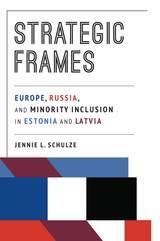
Strategic Frames analyzes minority policies in Estonia and Latvia following their independence from the Soviet Union. It weighs the powerful influence of both Europe and Russia on their policy choices, and how this intersected with the costs and benefits of policy changes for the politicians in each state.
Prior to EU accession, policymakers were slow to adopt minority-friendly policies for ethnic Russians despite mandates from the European Union. These initiatives faced majority opposition, and politicians sought to maintain the status quo and their positions. As Jennie L. Schulze reveals, despite the credit given to the democratizing influence of European institutions, they have rarely produced significant policy changes alone, and then only when domestic constraints were low. Whenever domestic opposition was high, Russian frames were crucial for the passage of reforms. In these cases, Russia’s activism on behalf of Russian speakers reinforced European frames, providing powerful justifications for reform.
Schulze’s attention to both the strategic framing and counter framing of external actors explains the controversies, delays, and suboptimal outcomes surrounding the passage of “conditional” amendments in both cases, as well as the local political climate postaccession.
Strategic Frames offers a significant reference on recent developments in two former Soviet states and the rapidly evolving spheres of political influence in the postindependence era that will serve students, scholars, and policymakers alike.
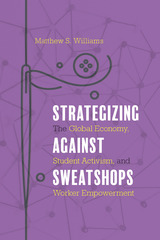
For the past few decades, the U.S. anti-sweatshop movement was bolstered by actions from American college students. United Students Against Sweatshops (USAS) effectively advanced the cause of workers’ rights in sweatshops around the world. Strategizing against Sweatshops chronicles the evolution of student activism and presents an innovative model of how college campuses are a critical site for the advancement of global social justice.
Matthew Williams shows how USAS targeted apparel companies outsourcing production to sweatshop factories with weak or non-existent unions. USAS did so by developing a campaign that would support workers organizing by leveraging their college’s partnerships with global apparel firms like Nike and Adidas to abide by pro-labor codes of conduct.
Strategizing against Sweatshops exemplifies how organizations and actors cooperate across a movement to formulate a coherent strategy responsive to the conditions in their social environment. Williams also provides a model of political opportunity structure to show how social context shapes the chances of a movement’s success—and how movements can change that political opportunity structure in turn. Ultimately, he shows why progressive student activism remains important.
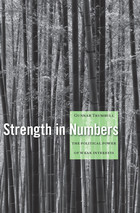
Many consumers feel powerless in the face of big industry’s interests. And the dominant view of economic regulators (influenced by Mancur Olson’s book The Logic of Collective Action, published in 1965) agrees with them. According to this view, diffuse interests like those of consumers are too difficult to organize and too weak to influence public policy, which is determined by the concentrated interests of industrial-strength players. Gunnar Trumbull makes the case that this view represents a misreading of both the historical record and the core logic of interest representation. Weak interests, he reveals, quite often emerge the victors in policy battles.
Based on a cross-national set of empirical case studies focused on the consumer, retail, credit, pharmaceutical, and agricultural sectors, Strength in Numbers develops an alternative model of interest representation. The central challenge in influencing public policy, Trumbull argues, is not organization but legitimation. How do diffuse consumer groups convince legislators that their aims are more legitimate than industry’s? By forging unlikely alliances among the main actors in the process: activists, industry, and regulators. Trumbull explains how these “legitimacy coalitions” form around narratives that tie their agenda to a broader public interest, such as expanded access to goods or protection against harm. Successful legitimizing tactics explain why industry has been less powerful than is commonly thought in shaping agricultural policy in Europe and pharmaceutical policy in the United States. In both instances, weak interests carried the day.

Are large American corporations politically unified or divided? This question, which has important implications for the viability of American democracy, has frustrated social scientists and political commentators for decades. Despite years of increasingly sophisticated research, resolution of the issue remains as elusive as ever.
In this important book, Mark S. Mizruchi presents and tests an original model of corporate political behavior. He argues that because the business community is characterized by both unity and conflict, the key issue is not whether business is unified but the conditions under which unity or conflict occurs.
Adopting a structural model of social action, Mizruchi examines the effects of factors such as geographic proximity, common industry membership, stock ownership, interlocking directorates, and interfirm market relations on the extent to which firms behave similarly. The model is tested with data on the campaign contributions of corporate political action committees and corporate testimony before Congress. Mizruchi finds that both organizational and social network factors contribute to similar behavior and that similar behavior increases a group's likelihood of political success.
This study demonstrates that rather than making their political decisions in a vacuum, firms are influenced by the social structures within which they are embedded. The results establish for the first time that the nature of relations between firms has real political consequences.
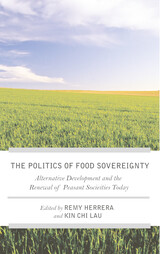
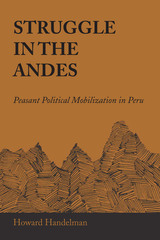
A massive land-seizure movement first erupted in Peru in 1958 and spread across the Andean highlands in 1963–1964. Several hundred peasant communities in the Peruvian Andes occupied neighboring haciendas in an attempt to retake lands they felt had been stolen from them over the years. Hacienda peasants also participated in this movement, forming peasant sindicatos (unions) to improve their labor conditions.
The land-seizure movement brought with it an upsurge in community political mobilization. Throughout the highlands, village leaders banded together in regional federations, often allying themselves with progressive or radical urban groups. Radical activists from labor unions and university student groups joined with indigenous peasant leaders, breaking down the highland peasantry’s traditional isolation from the political system.
Struggle in the Andes is an analysis of the causes and consequences of extensive social and political mobilization among Peru’s peasant population in the 1960s. In addition to describing the growth of the peasant land movement, Howard Handelman investigates the social and economic conditions that contributed to rural unrest. Using data that he collected in forty-one diverse highland communities, Handelman examines the correlates of peasant political activity, concluding that land seizures in the traditional southern sierra had different origins and political implications than did unrest in the more socioeconomically modernized central highlands.
The data suggest a model of peasant mobilization that calls into question prevailing scholarly hypotheses on the relationships between modernization, peasant political mobilization, and radicalization. Handelman discusses the land-reform program and the accompanying rural mobilization that was being implemented by Peru’s reformist military regime. Using his model of peasant mobilization, he speculates on the possible effects of the government’s contemporary programs on future peasant political behavior.
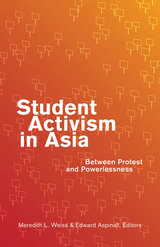
Since World War II, students in East and Southeast Asia have led protest movements that toppled authoritarian regimes in countries such as Indonesia, South Korea, and Thailand. Elsewhere in the region, student protests have shaken regimes until they were brutally suppressed—most famously in China’s Tiananmen Square and in Burma. But despite their significance, these movements have received only a fraction of the notice that has been given to American and European student protests of the 1960s and 1970s. The first book in decades to redress this neglect, Student Activism in Asia tells the story of student protest movements across Asia.
Taking an interdisciplinary, comparative approach, the contributors examine ten countries, focusing on those where student protests have been particularly fierce and consequential: China, Japan, Hong Kong, Taiwan, South Korea, Indonesia, Burma, Malaysia, Thailand, and the Philippines. They explore similarities and differences among student movements in these countries, paying special attention to the influence of four factors: higher education systems, students’ collective identities, students’ relationships with ruling regimes, and transnational flows of activist ideas and inspirations.
The authors include leading specialists on student activism in each of the countries investigated. Together, these experts provide a rich picture of an important tradition of political protest that has ebbed and flowed but has left indelible marks on Asia’s sociopolitical landscape.
Contributors: Patricio N. Abinales, U of Hawaii, Manoa; Prajak Kongkirati, Thammasat U, Thailand; Win Min, Vahu Development Institute; Stephan Ortmann, City U of Hong Kong; Mi Park, Dalhousie U, Canada; Patricia G. Steinhoff, U of Hawaii, Manoa; Mark R. Thompson, City U of Hong Kong; Teresa Wright, California State U, Long Beach.
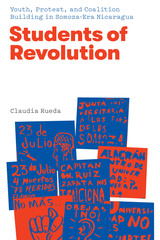
Students played a critical role in the Sandinista struggle in Nicaragua, helping to topple the US-backed Somoza dictatorship in 1979—one of only two successful social revolutions in Cold War Latin America. Debunking misconceptions, Students of Revolution provides new evidence that groups of college and secondary-level students were instrumental in fostering a culture of insurrection—one in which societal groups, from elite housewives to rural laborers, came to see armed revolution as not only legitimate but necessary.
Drawing on student archives, state and university records, and oral histories, Claudia Rueda reveals the tactics by which young activists deployed their age, class, and gender to craft a heroic identity that justified their political participation and to help build cross-class movements that eventually paralyzed the country. Despite living under a dictatorship that sharply curtailed expression, these students gained status as future national leaders, helping to sanctify their right to protest and generating widespread outrage while they endured the regime’s repression. Students of Revolution thus highlights the aggressive young dissenters who became the vanguard of the opposition.
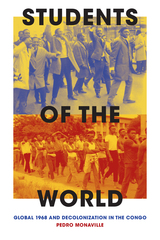

“I think we have to get to the real, to catch the facts we have, to hold on to what we see. . . .in this time where lies are currency,” Sonya Huber writes in her book-length essay Supremely Tiny Acts: A Memoir of a Day. On the theory that naming the truths of quotidian experience can counter the dangerous power of lies, she carefully recounts two anxiety-fueled days one fall. On the first, she is arrested as part of a climate protest in Times Square. On the other, she must make it to her court appearance while also finding time to take her son to get his learner's permit. Paying equal attention to minor details, passing thoughts, and larger political concerns around activism and parenting in the Trump-era United States, Huber asks: How can one simultaneously be a good mother, a good worker, and a good citizen? As she reflects on the meaning of protest and on whiteness and other forms of privilege within political activism, Huber offers a wry, self-aware, and stirring testament to the everyday as a seedbed for meaningful change.
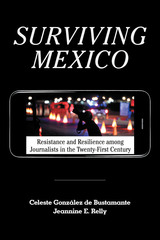
Mott KTA Journalism and Mass Communication Research Award, Kappa Tau Alpha
Tankard Book Award, Association for Education in Journalism and Mass Communication (AEJMC)
Knudson Latin America Prize, Association for Education in Journalism and Mass Communication (AEJMC)
Since 2000, more than 150 journalists have been killed in Mexico. Today the country is one of the most dangerous in the world in which to be a reporter. In Surviving Mexico, Celeste González de Bustamante and Jeannine E. Relly examine the networks of political power, business interests, and organized crime that threaten and attack Mexican journalists, who forge ahead despite the risks.
Amid the crackdown on drug cartels, overall violence in Mexico has increased, and journalists covering the conflict have grown more vulnerable. But it is not just criminal groups that want reporters out of the way. Government forces also attack journalists in order to shield corrupt authorities and the very criminals they are supposed to be fighting. Meanwhile some news organizations, enriched by their ties to corrupt government officials and criminal groups, fail to support their employees. In some cases, journalists must wait for a “green light” to publish not from their editors but from organized crime groups. Despite seemingly insurmountable constraints, journalists have turned to one another and to their communities to resist pressures and create their own networks of resilience. Drawing on a decade of rigorous research in Mexico, González de Bustamante and Relly explain how journalists have become their own activists and how they hold those in power accountable.

What drives the cycle of backlashes against women’s ongoing struggle for equality, freedom, and inclusion in American politics? In her innovative and provocative book, Suspect Citizens, Jocelyn Boryczka presents a feminist conceptual history that shows how American politics have largely defined women in terms of their reproductive and socializing functions. This framework not only denies women full citizenship, but also devalues the active political engagement of all citizens who place each other and their government under suspicion.
Developing the gendered dynamics of virtue and vice, Boryczka exposes the paradox of how women are perceived as both virtuous moral guardians and vice-ridden suspect citizens capable of jeopardizing the entire nation’s exceptional future. She uses wide-ranging examples from the Puritans and contemporary debates over sex education to S&M lesbian feminists and the ethics of care to show how to move beyond virtue and vice to a democratic feminist ethics.
Suspect Citizens advances a politics of collective responsibility and belonging.

Starting in 2002, Rubin and Sokoloff-Rubin traveled together to southern Brazil, where they interviewed activists over the course of ten years. Their vivid descriptions of women’s lives reveal the hard work of sustaining a social movement in the years after initial victories, when the political way forward was no longer clear and the goal of remaking gender roles proved more difficult than activists had ever imagined. Highlighting the tensions within the movement about how best to effect change, Sustaining Activism ultimately shows that democracies need social movements in order to improve people’s lives and create a more just society.
READERS
Browse our collection.
PUBLISHERS
See BiblioVault's publisher services.
STUDENT SERVICES
Files for college accessibility offices.
UChicago Accessibility Resources
home | accessibility | search | about | contact us
BiblioVault ® 2001 - 2024
The University of Chicago Press









